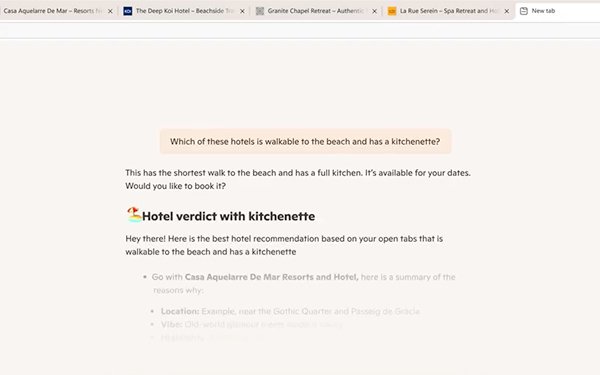
Browser wars hit hard earlier this week with
Microsoft releasing an embedded experimental version of Copilot AI assistant in Edge. The feature gives users a way to sort through information and navigate the web without spending the time to do it
themselves.
Copilot Mode enables AI features in Edge to anticipate what someone browsing the web might want to do next rather than wait for the person to click on something in the
open web-browsing window. The technology can read information across open browsing tabs.
Microsoft's feature announced earlier this week can evaluate a set of travel destinations, for
example, as well as flights and hotel reservations, and compare them to organize a vacation, if the tabs are open.
It can bring up the details required for any query, with permission,
and understand the full context of what the person wants to explore online such as identifying what options are closest to the beach or recreation areas. The feature also can book and
confirm reservations.
advertisement
advertisement
Microsoft’s Copilot Mode feature comes the month before the U.S. Department of Justice is scheduled to decide whether Google would need to divest its Chrome browser
based on a proposed remedy in a search monopoly case, with a decision expected by August 2025.
Users can speak directly to Copilot about what they are trying to accomplish, whether it’s
locating information on a page, or having Copilot open a few tabs to compare options between products. The blog post makes no mention of whether the data will be used to trigger ads or suggest
specific media-buying options.
Microsoft said it will soon enable users to give Copilot permission to access additional browser context it needs, such as someone's history and credentials, to
take more advanced and seamless actions like booking reservations or managing errands on a user's behalf.
When asked to “find me a paddleboard rental near work,” Copilot not only
finds the best option, but also checks the weather, makes the booking and suggests sunscreen or tutorial videos to help you prepare.
It will guide tasks and organize past and present browsing
sessions based on topics, and make suggestions for what to do next.
For example, if researching how to start an online business, Copilot can recognize that and surface relevant insights,
including recommending a tutorial to watch as the person explores different website-building methods.
Microsoft said in the post it only collects the data with permission when needed to
improve the experience based on personalization settings.
The data is protected under Microsoft’s trusted privacy standards that are built to keep information safe, secure and never
shared without permission.
Of course, this comes from the company who recently was accused of allowing China-based engineers to assist with Pentagon cloud systems with inadequate
guardrails to scale up its government contracting business, raising espionage concerns from national security experts.
The report released this month cited employees and government contractors who worked on a
2016 cloud computing program from Microsoft that would allow the company to sell its cloud services to the government, known as a "digital escort" framework.